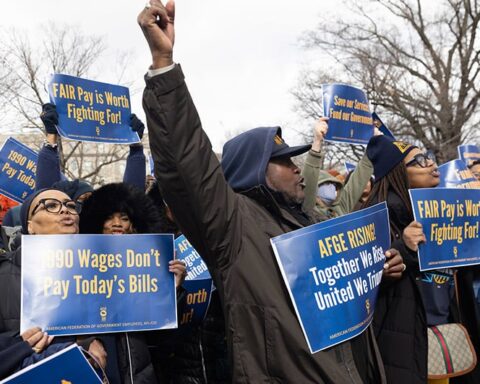While President Donald Trump’s executive orders have labeled diversity, equity and inclusion programs as “discriminatory,” several women who occupy STEM-related positions in the federal government slammed his directives as policies that only seek to widen the existing gender and racial divides.
Concerns ranging from limited access to STEM careers to feeling unwelcome under the new administration, women scientists, engineers and other women federal employees told NBC News that they fear for their professional future.
“If we really have a society where there’s ‘equal’ participation and anybody can do anything, then where are the women in STEM?” said one woman who’s Hispanic and works in a science and tech-related federal organization. She requested anonymity out of fear of retaliation.
The Trump administration did not immediately respond to requests for comment. But previously, White House press secretary Karoline Leavitt said in a statement that the executive orders were an example of “promises made, promises kept.”
“President Trump campaigned on ending the scourge of DEI from our federal government and returning America to a merit based society where people are hired based on their skills, not for the color of their skin,” she said in the statement. “This is another win for Americans of all races, religions, and creeds.”
STEM fields have long been criticized for their lack of diversity. While women make up more than half of the U.S. population, they constituted about a third of all people in STEM jobs in 2021, according to the National Center for Science and Engineering Statistics. And their wages were consistently lower than that of men. Black and Hispanic workers represented 9% and 15% of the workforce respectively, despite constituting higher percentages of the population, the data showed.
Other marginalized groups also face barriers to career advancement in STEM, including across federal government positions, stats have shown. For example, at the USDA Forest Service, which features jobs in fields like sustainability, climate and engineering, a 2023 study showed that even when nonwhite women entered the workforce at a higher grade, they advanced more slowly and ended up spending fewer years at the agency. Also, nonwhite men at the Forest Service were “more likely to be terminated than any other group,” according to the same study.
One federal employee who is Black and has worked at a number of state, local and federal STEM-related agencies, said that anti-DEI efforts could hinder scientific advancements and problem-solving capacities. She asked to remain anonymous for fear of retaliation. “Scientific integrity demands diversity, and that we know that we get better outcomes when we have diversity amongst research teams, and because they bring different perspectives,” said the employee, who was put on leave last week. “It only improves the shaping of research questions and the interpretation of results. So it matters. It matters to the science.”
The employee said that the government’s work in STEM could only benefit from more diversity.
“Humans are complicated and no one — no one race or creed — no one has it figured out,” the employee said. “The more that we can work together, we can improve our outcomes.”
One biologist who works for the federal government, who requested anonymity out of fear of retaliation, mentioned that earlier in her career she took part in a paid federal internship for underrepresented groups. And it led to a full-time STEM position. Such programs now under threat only help even the playing field for those from marginalized communities, she said, who more likely do not have means to take on unpaid internships, or have the connections to get their foot in the door in those industries.
“You can compete for jobs you weren’t able to before,” the biologist said. “That’s highly important for people who are from lower income, middle income, who are mothers who might not have the free time to go and do all this volunteer work.”
Programs that help recruit diverse talent, the biologist said, do not hand out jobs to unqualified individuals, as some misconceptions may suggest. They simply give people who ordinarily would not have the opportunity to compete for STEM careers the opportunity to do so, she said.
“It doesn’t mean that I was hired directly into this job, that I didn’t have to compete, that I was hired because I’m a woman, or because I’m gay,” the biologist said. “They thought that I was the best applicant or candidate for the job.”
The sunsetting of DEI programs and the pausing of certain volunteer support groups — like employee resource groups — could deter women and minorities from applying or being chosen for STEM positions altogether, said the federal worker who is Hispanic. With so many men in their fields, those groups and programs have historically helped women and minorities better navigate workplace dynamics, ask critical questions in a safe space and feel comfortable being themselves at work, the employee said.
“How do you stand shoulder to shoulder with folks that, just because they’re male, they’re getting listened to more?” the worker said. “When you feel like you have a part of the community and you have other people you can lean on, you can do your job better.”





